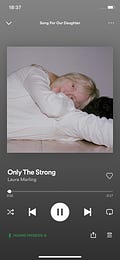Laura Marling is magnificent, I will hear no different
Zero points for guessing what my Spotify wrapped looked like this year.
Hi all,
This week I’ve been in Athens, escaping the cold and reminding myself that warm bones are happy bones. What novelty to plant yourself in pools of bright light at an outside cafe, assured you can leave your big jacket at home in December. As I write this I’m plopped on a sofa in the departures lounge, awaiting snow in London. Each winter I forget just how frozen solid I become, that for three months of the year I am attached to radiators, blankets, hot water bottles, missing an ambient 20 degrees that coaxes us to move as we humans are meant to do.
This week’s newsletter is an exploration of Laura Marling, and why she’s so bloody fabulous. Enjoy!
Sound bathing
It was a winter of long baths, bubbled up with heady essential oil laden soaps keeping me company as I cocooned through the darkest months.
That year the bath was a bucket, large enough for me at 5’8 to fully extend my legs, so when November rolled around I got into its scalding waters and didn’t clamber out, dripping, until the bouquets of March were beginning to bloom.
Laura Marling sang to me that winter, phone propped precariously on the edge of the closed porcelain loo (hygiene, I know), bastardising her acoustic melodies through my iPhone 7. Song for Our Daughter was, and is, one of my favourite albums, Marling grasping a tenderness and care to younger versions of herself that is coy with its dry wit and generous with its wisdom.
It’s an album I’ve listened to over and over, one that pierces right through to the immediacy and threat of being a woman, tinged with the melancholy and grief of what you learn the hard way, often the only way in these conditions.
Marling has a unique talent at holding this vulnerability without getting too lost inside of it; she moves in and out, freely, edging closer and softly, away. “Get lost in the crowd. Seen or unseen. Say what you mean”, she tells us, never being consumed by just one feeling across her body of work but picking apart each emotion to crack open more.
I adore soaking up this complexity, mulling it over as Marling shows us how we may coexist in our contradictions, to honour what it means to be ‘Semper Femina’, always a woman (the name of her sixth album). Her words shine a light on the layers of meaning you carry, and those you make yourself, crafting stories deeper than the broad brush stroke of ‘victim’. It’s a super glue narrative that our culture encourages us to sustain out of the reality of having to half-live it anyway*1 In her writing Marling looks past the wronged woman, betrayed before she has begun, to find an emotional richness of a truer self away from stories told of us, without our true consent, beckoning us to choose a more complex pen for the tales we tell.
There is an ample market for the wronged woman in our culture. It sells books, songs, cults of personalities, and each generation it dresses up as something slightly different. It exploits sadness, or seeks to reclaim it to make it something new. This is where my appreciation of Taylor Swift as a writer has its limits. I cannot let myself surrender to her music completely, for fear I will make my own disposition of feeling the injured party all the more severe and self-actualised. It’s where commercial interests limit artistic expression - aside from folklore which offers more complexity when the stories do not focus on Swift herself - and trap the sadness of the wronged woman in a feedback loop. I do not think it does women good to linger in this sadness for fear of getting lost completely in its depths, never to return.
Marling’s Song for Our Daughter, is a tender example of holding this vulnerability without it becoming your prison cell. It is my favourite song of hers, perfect for young women in that ripe age of deep feeling and confusion at how the world works. It’s euphoric and hopeful in its string composition; it refuses to become a gravestone to the heaviness of implied sexual assault, carried through the lyrics ‘there’s blood on the floor, maybe now they’ll believe her for sure’, and instead turns attention towards the care and life lessons found in Marling’s imagined position as mother, big-sister, friend. “Though they may want you to tread in their trail. Only to see if the path they set fails”, she reassures us that we are more: “do you remember what I said? The book I left by your bed? The words that some survivor read?”
I find reassurance in the voices of older women who have walked the path before me. I am porous to the great minds of others when my own thoughts steam out of my brain and curl into icy tendrils in the palpable air above my bath. I honour what the women I admire have seen, heard, done. How they have carved out their own way from the grooves of those who too have come before them. Today, my interest is much less in these women’s relation to men, than the beauty in the depth of their life experience. Marling I think, feels the same, sharing “I won’t write a woman with a man on my mind”.
I’m drawn to writers, women, who have been socialised to speak (or at least exist, for there are politics around speaking) with the emotions we all feel. I want to know how have they seen the world, how have they shouldered it with such chasms of beauty and loss at every corner. How to build a meaningful life. I do not believe that all women’s writing is emotionally-led, but it would not be a bad thing if more writing took on greater vulnerability in a world where such a disregard for it has caused deep harm to our planet and people.
But Marling too is wry, fiery, outspoken, having quite the knack for not getting stuck in vulnerability to the point of petrification, drawing herself out to generously offer up her words. This is a lesson I must learn. She warns us “only the strong survive”, when it comes to navigating this life and remaining resolute. Over-sentimentality has its dangers, tethering you to the past: “wish I could go back and find, letters I wrote you in my mind, perhaps I could unknot us from this awful bind, most I have forgot or overrefined”.
Marling shows us that you can, in-fact you must, be both vulnerable and strong, drawing from your emotional reserves while leaving yourself a light to find your way back to the surface.
Last winter I was caught inside ‘Strange Girl’, where I “roll(ed) like a tidal wave”, jumbling. The more I ventured, the more I learned (if not gained). This winter I’m burrowing down further, but I want to welcome in more of that silliness that Marling taunts of your twenties: “waking up in a country who refused to hold your hand and “building yourself a garden to have something to attend”. I’ve already ticked a fair few off, the “falling for narcissists who insist you call them man”, the “cutting off relations ‘cause you could not stand your friends”. Does this make me old? I have already taken the advice of Self Esteem stop sending long paragraph texts.
It’s redemptive to know artists I greatly admire also spend their lives growing up and down. All moments pass and give way to different moments, which in their own time will slip away to be replaced by others. We may not have Marling’s book of advice that she left by the bed for her fictionalised daughter, but we do have the guidance to “stay low, keep brave”. That, and a back catalogue of albums to soak up in aromatic bath water, learning what it is to be.
Next month I’ll be recording a talk on Laura Marling and sanctuary. One question that leaps out to me now: as women, how do we craft different kinds of sanctuaries, away from those worn in by patriarchal storytelling? How do we move past the self-destructive harm of the wronged woman stereotype that gnaws you all the more than it ever will the society it sits within? How, with compassion? Not in the name of intrinsic femininity, but in the name of our humanity.
Writing for the week
I feel after my spiel about Laura Marling, I really must recommend some of her music. Go for Song for Our Daughter if you want a tender album about growing and grieving and rising from the ashes. If you want one that’s more about claiming this life for yourself, chasing down that hunger inside, then you have Semper Femina. Stylistically, Semper takes more influence from American folk and country, whereas Song introduces more piano and strings.
Special mention for ‘Wild Fire - Live’ for its dry humour and gorgeous melodies, *chefs kiss*
Balm for the week
It’s a step too far to name the whole city of Athens my balm for the week, so I’ll settle on the Acropolis museum. This gargantuan space honours over 2000 years of Athenian history, telling the story of ancient temples, decades long wars and rich mythology to paint the picture of a vivid civilisation that built and rebuilt itself to become the iconic classical power we read about. The museum building itself rises to the challenge, with vast concrete, floor to ceiling windows and dramatic walkways imposing the scale and size of Athenian history.
Alongside the celebration of democracy, art, education, this museum weaves a story of the risks of expansionism, colonialism and empire. It warns us that true Athenian democracy cracked when the city got power hungry and attempted to control neighbouring city states, leading to conflict that weakened everyone and left them more vulnerable to attack (a tale as old as time). In the museum’s curation there’s a palpable grief at the destruction of various iterations of the Acropolis due to conflict. Whether it’s the Persians, Turks, Venetians or Brits, the Acropolis is a living breathing site that has been chipped and blasted apart by those who yearn for power. It is no understatement to say that the condition of those iconic temples are a metaphor for the condition of Athens (and by extension, Greece) itself. When they are crumbled, so are its people.
Take care,
Eden
Such thought reminds me of 20th century author, Angela Carter, who detested women she perceived as clinging onto the label of martyr. Cultural myths that women upheld were ‘consolatory nonsenses’ keeping women from claiming and demanding their real power (Angela Carter would be angry at me for losing my head for the last year and half, sorry Angie). In response she creates murky female characters, using their agency for their own ends, more individual than collective, abusive, grotesque in sexual and societal deviance, masculine in many ways, ones that will kill their babies, turn into tigers, relish rape. They are beyond redemption; Carter’s women are the children of de Sade. I can’t say I like or necessarily respect them in their rejection of care itself, but they have a lifeblood that cannot be denied.




